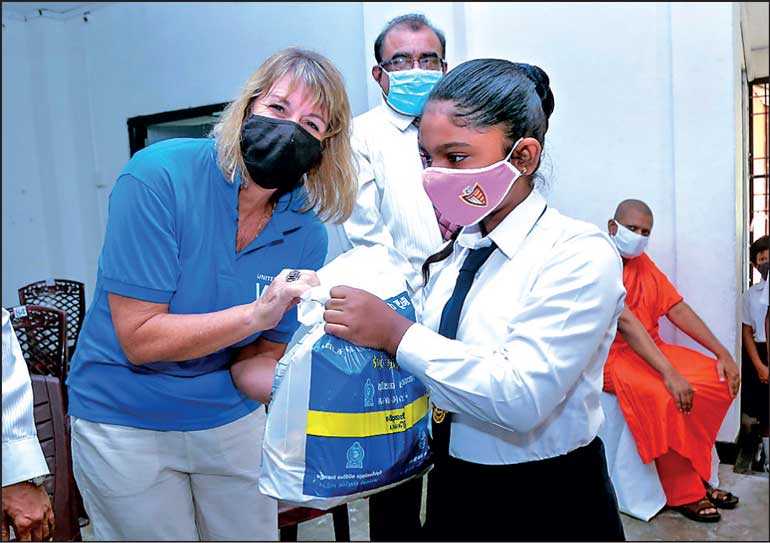Wednesday Feb 18, 2026
Wednesday Feb 18, 2026
Monday, 12 October 2020 00:28 - - {{hitsCtrl.values.hits}}

World Food Program Country Director Brenda Barton handing a take-home ration pack to a student in Kalapaluwawa
World Food Program Country Director Brenda Barton on Friday said the winning of Nobel Peace Prize was in recognition of WFP staff worldwide, including those in Sri Lanka, who work tirelessly to develop a better future for vulnerable communities everywhere.
WFP Sri Lanka, in a statement, said WFP is the largest humanitarian organisation in the world. Last year, it assisted 97 million people in 88 countries. Two-thirds of WFP’s work is in conflict-affected countries where people are three times more likely to be undernourished than those living in countries without conflict. There can be no lasting peace when children are hungry. By saving lives during times of crisis and changing lives in times of peace, WFP is delivering an invaluable service to humanity.
WFP was recognised “for its efforts to combat hunger, for its contribution to bettering conditions for peace in conflict-affected areas and for acting as a driving force to prevent the use of hunger as a weapon of war and conflict”, said Norwegian Nobel Committee Chair Berit Reiss-Andersen.
The COVID-19 crisis has added to global food insecurity with an increasing number of people going hungry. The pandemic, with its brutal impact on economies and communities, is pushing millions of people worldwide to the brink of starvation.
Globally and in Sri Lanka, WFP focuses on emergency assistance, relief and rehabilitation, development aid and special operations. In Sri Lanka, WFP has worked with the Government and other partners to save lives and livelihoods and make profound changes to ensure people have better access to food and nutrition.
“For more than half a century, WFP staff have dedicated themselves to helping communities in Sri Lanka, from assisting during the tsunami and post conflict period, to providing nourishing school meals to children,” says WFP Country Director in Sri Lanka Brenda Barton. “We are profoundly honoured that WFP has received this award, which is in recognition of WFP staff worldwide, including those in Sri Lanka, who work tirelessly to develop a better future for vulnerable communities everywhere.”
WFP Executive Director David Beasley on Friday said winning the Nobel Peace Prize was a humbling and moving recognition of its work to feed millions of people suffering from hunger.
“The awarding of the Nobel Peace Prize to the World Food Program (WFP) is a humbling, moving recognition of the work of WFP staff who lay their lives on the line every day to bring food and assistance for close to 100 million hungry children, women and men across the world. People whose lives are often brutally torn apart by instability, insecurity and conflict,” said Beasley.
Every one of the 690 million hungry people in the world today has the right to live peacefully and without hunger. Today, the Norwegian Nobel Committee has turned the global spotlight on them and on the devastating consequences of conflict. Climate shocks and economic pressures have further compounded their plight. And now, a global pandemic with its brutal impact on economies and communities, is pushing millions more to the brink of starvation.
The Nobel Peace Prize is not WFP’s alone. “We work closely with government, organisations and private sector partners whose passion for helping the hungry and vulnerable equals ours. We could not possibly help anyone without them. We are an operational agency and the daily work of our staff each day is driven by our core values of integrity, humanity and inclusion.
“Where there is conflict, there is hunger. And where there is hunger, there is often conflict. Today is a reminder that food security, peace and stability go together. Without peace, we cannot achieve our global goal of zero hunger; and while there is hunger, we will never have a peaceful world.”